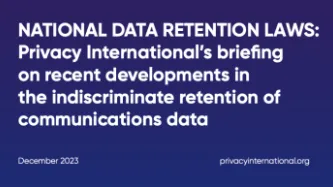Advanced Search
Content Type: News & Analysis
Today we learned the UK has issued a new secret order forcing Apple to undermine iCloud’s advanced encryption again, but this time only for UK users.While this seems like progress - and it is in the sense that the UK is clearly reacting to the global concern and US Government pressure generated by its original directive to Apple - the new order may be just as big a threat to worldwide security and privacy as the old one. The status of the original order remains unclear.If true, this new order…
Content Type: Press release
On 18th August 2025, Privacy International has issued a formal complaint to the UK Information Commissioner (ICO) about the Home Office’s (HO) use of two automated tools in immigration enforcement operations, which PI argues do not adequately comply with the UK General Data Protection Regulation (GDPR) and Data Protection Act 2018 (DPA 2018). The Identify and Prioritise Immigration Cases (IPIC) tool and the Electronic Monitoring Review Tool (EMRT) appear to be used to make life-altering…
Content Type: Long Read
On the basis of a year of legal research by PI as well as documents obtained by other civil society organisations, and evidence provided by legal representatives fighting these automated systems on behalf of their clients, on the 18th August 2025, we issued a formal complaint to the UK Information Commissioner (ICO) regarding the UK Home Office’s use of two ‘automated recommendation-making tools’ (ARMTs), the Identify and Prioritise Immigration Cases tool (IPIC) and the Electronic Monitoring…
Content Type: Advocacy
The Open informal consultations on lethal autonomous weapons systems, held in accordance with General Assembly resolution 79/62 at the UN in New York on 12-13 May 2025, examined various legal, humanitarian, security, technological, and ethical aspects of these weapons. These consultations aimed to broaden the scope of AWS discussions beyond those held by the Group of Governmental Experts (GGE) at the UN in Geneva. Find out more about what happened during the discussions at Researching Critical…
Content Type: Long Read
On 13 March 2025, we filed a complaint against the UK government challenging their use of dangerous, disproportionate and intrusive surveillance powers to undermine the privacy and security of people all over the world. Here, we answer some key questions about the case and the recent events that led to this development.Note: This post was last updated on 13 March 2025.What’s the fuss about?A month ago, it was reported that the UK government demanded Apple Inc – maker of the iPhone, iPads, Macs…
Content Type: Long Read
18th December is International Migrants Day, a day to recognize both the contributions and continued struggles of migrants across the world.Migrants continue to face an increased level of human rights violations through hostile immigration policies and practices. At borders and beyond, their fundamental human rights and dignity are being violated through old and new technologies. These systems in place reinforce the dehumanising rhetoric of migrants, who are merely seeking asylum and a better…
Content Type: Report
With this report, we shed light on the due process implications of the blanket and indiscriminate surveillance of protesters, activists, and human rights defenders participating in protests. We demonstrate that information gathered through the surveillance of protests is being used in criminal proceedings against activists, protesters, and human rights defenders. We also also show that when this information is being admitted as evidence in criminal proceedings it undermines the right to fair…
Content Type: Long Read
The fourth edition of PI’s Guide to International Law and Surveillance provides the most hard-hitting past and recent results on international human rights law that reinforce the core human rights principles and standards on surveillance. We hope that it will continue helping researchers, activists, journalists, policymakers, and anyone else working on these issues.The new edition includes, among others, entries on (extra)territorial jurisdiction in surveillance, surveillance of public…
Content Type: Report
First published in 2017, PI’s Guide to International Law and Surveillance is an attempt to collate relevant excerpts from these judgments and reports into a single principled guide that will be regularly updated. This is the fourth edition of the Guide. It has been updated it to reflect the most relevant legal developments until March 2024.The Guide aspires to be a handy reference tool for anyone engaging in campaigning, advocacy, and scholarly research, on these issues. The fourth…
Content Type: Advocacy
In an increasingly digitised world, automation, artificial intelligence and sensitive data processing present new and rapidly shifting challenges which underscore the urgent need for states to ensure that the rights of persons with disabilities are explicitly addressed and centred when it comes to the use of data and technology. Digital technologies can offer important opportunities for accessibility and the realisation of human rights of persons with disabilities, but can also present…
Content Type: News & Analysis
On 15 May 2024, a London Administrative Court handed down its judgment in the case of ADL & Ors v Secretary of State for the Home Department, just two months after another court judgment and a ruling of the UK's data protection authority (ICO). The four Claimants in this latest case (including asylum seekers and survivors of trafficking) were challenging the UK Home Office's policy of placing people released from immigration detention under 24/7 GPS surveillance - either by shackling them…
Content Type: Video
The case dealt with a Russian law obliging telecommunications service providers to indiscriminately retain content and communications data for certain time periods, as well as a 2017 disclosure order by the Russian Federal Security Service requiring Telegram Messenger company to disclose technical information which would facilitate “the decoding of communications”.Links:PI case pageECtHR judgment in the Podchasov casePI's work on encryptionPI's report on End-to-End Encryption (E2EE)More…
Content Type: Advocacy
In September 2020, the Secretary-General in September 2021 released his report Our Common Agenda, and it proposed a Global Digital Compact (GDC) which was expected to “outline shared principles for an open, free and secure digital future for all”. The GDC is expected to be agreed at the UN Summit of the Future in September 2024. Following some initial consultations, a Zero Draft of the Global Digital Compact was published on 1 April 2024, and the co-facilitators outlined…
Content Type: Advocacy
On 10 April 2024, the European Parliament adopted the New Pact on Migration and Asylum, a package of reforms expanding the criminalisation and digital surveillance of migrants.
Despite civil society organisationsʼ repeated warnings, the Pact “will normalise the arbitrary use of immigration detention, including for children and families, increase racial profiling, use ʻcrisisʼ procedures to enable pushbacks, and return individuals to so called ʻsafe third countriesʼ where they are at risk of…
Content Type: Advocacy
Privacy International (PI) welcomes the opportunity to provide input to the forthcoming report the Special Rapporteur on contemporary forms of racism, racial discrimination, xenophobia and related tolerance to the 56th session of Human Rights Council which will examine and analyse the relationship between artificial intelligence (AI) and non-discrimination and racial equality, as well as other international human rights standards.AI applications are becoming a part of everyday life:…
Content Type: Report
Over the past years, data retention regulation imposing generalised and indiscriminate data retention obligations to telecommunication companies and Internet service provides has been introduced in various jurisdictions across the world. As the data retention practices across the world have evolved this new report is an attempt to shed some light on the current state of affairs in data retention regulation across ten key jurisdictions. Privacy International has consulted with human…
Content Type: Advocacy
Privacy International has joined several UK civil society organisations from across sectors in expressing our deep concerns regarding the financial surveillance powers proposed in the UK Data Protection and Digital Information Bill (DPDI Bill). Specifically outlined in Clause 128 and Schedule 11, these measures introduce mass algorithmic surveillance aimed at scrutinizing bank and third-party accounts to purportedly detect welfare fraud and errors. In other words, the Department for Work…
Content Type: News & Analysis
In a significant and forceful decision, on 1 March 2024 the UK's Data Protection Authority found that the UK Government's GPS tagging of migrants arriving to the UK by small boats and other "irregular" routes was unlawful.
The decision comes as a result of Privacy International's complaint filed in August 2022 against the GPS tagging policy, which alleged widespread and significant breaches of privacy and data protection law. Our complaint relied extensively on anonymous testimonies of…
Content Type: Advocacy
Privacy International welcomed the opportunity to provide input to the study of the UN Human Rights Council Advisory Committee on the human rights implications of new and emerging technologies in the military domain (NTMD) to be presented to the Human Rights Council at its sixtieth session.In the course of our work, we observe that the line between military and civilian technologies is blurring. Governments are increasingly relying on the very same technologies for military and civilian uses.…
Content Type: Advocacy
Privacy International (PI), Big Brother Watch (BBW), StopWatch, CopWatch, Defend Digital Me, Liberty and Statewatch have written to Home Secretary James Cleverly to raise concerns over the danger posed to UK society by Facial Recognition Technology (FRT).In a letter sent on 18 January 2024, the signatories raised concerns over the escalating use of FRT and warned the Home Secretary that "The indiscriminate use of this dystopian biometric technology to identify people in public spaces is a form…
Content Type: Long Read
18th December is International Migrants Day. It’s a day designated by the United Nations, dedicated to recognising the “important contribution of migrants while highlighting the challenges they face.”On this day we wish to recognise in particular the countless human rights violations that people experience at borders and within hostile immigration systems. We thank those who survive these violations for sharing with us and others their experiences of such violations, and for accepting to…
Content Type: Advocacy
In August 2023, the UK Westminster Women and Equalities Committee launched a call for evidence into a short inquiry on women’s reproductive health.We submitted a response highlighting the increasing management of women’s reproductive healthcare through digital health initiatives. We raised concerns that these technologies can be privacy-invasive and result in highly sensitive personal information being shared in unexpected and potentially dangerous ways. We encouraged the Committee to ensure…
Content Type: Advocacy
Dejusticia, Fundación Karisma, and Privacy International submitted a joint stakeholder report on Colombia to the 44th session of the Universal Periodic Review at the UN Human Rights Council.Our submission raised concerns regarding the protection of the rights to freedom of expression and opinion, to privacy, and to personal data protection; the shutdown of civil society spaces; protection of the right to protest; and protection of the rights of the Venezuelan migrant and refugee population.…
Content Type: Advocacy
We are responding to the UK Government's consultation to expand its powers around Technical Capabilities Notices and National Security Notices.
Background
Following Edward Snowden's revelations about the illegal and expansive secret powers of the US and UK intelligence agencies, the UK Government took the opportunity to, rather than reflect on what powers are proportionate in the modern era, to expand its arsenal of surveillance powers.
One of the powers it added was the ability to issue…
Content Type: Advocacy
Our submission focused on (1) the ways in which states are adopting data-intensive ID systems; (2) the adoption by national immigration enforcement agencies of other privacy-intrusive modes of surveillance and control, including tracking by way of 24/7 Global Positioning System (GPS) technology and mobile device data extraction; (3) how the intensification of border surveillance technologies facilitates further human rights violations; (4) the impact of border externalisation and transfer of…
Content Type: Long Read
Why does this decision matter?
Our complaint against Criteo formed part of a larger set of coordinated complaints we filed in 2018 against 7 data brokers (Acxiom, Oracle), AdTech companies (Criteo, Quantcast, Tapad), and credit referencing agencies (Equifax, Experian) with data protection authorities in France (CNIL), Ireland, (DPC) and the UK (ICO). The EU General Data Protection Regulation (GDPR) had recently come into force, and the AdTech industry was (and still is) a prime affront to the…
Content Type: Press release
La CNIL a aujourd'hui prononcé une sévère sanction contre Criteo, une des plus grandes sociétés françaises de pistage et publicité en ligne. Le montant de l'amende a été réduit de 60 à 40 millions d'euros depuis l'audience qui s'est tenue à la CNIL en Mars 2023, durant laquelle Criteo avait mis en avant son bénéfice net de 10 millions d'euros en 2022 pour plaider en faveur d'une réduction de sa peine. La CNIL semble avoir entendu ces arguments, mais a heureusement maintenu une amende…
Content Type: Press release
French data regulator CNIL announced today a strong sanction against Criteo, one of the world's largest AdTech companies. Although close to the maximum GDPR fine, the amount of the fine was reduced from 60 to 40 million following a hearing at CNIL's offices in March 2023, during which Criteo pleaded for a reduced fine in light of its 10 million euros profit in 2022. CNIL seems to have acknowledged this argument but maintained a significant fine. This sanction follows a Privacy International…
Content Type: Advocacy
Privacy International contributed to the UNSR's report by submitting information on the work we have done as well as our Network of partners as we’ve monitored and responded to developments associated with the use of data and technology in the health care sector by governments and companies.
Content Type: Advocacy
Background
In August 2022, Amazon announced that they had entered into a definitive merger agreement to acquire iRobot, a company that specialises in designing and building consumer robots. The transaction was formally notified to the European Commission on 1 June 2023, while the UK Competition and Markets Authority (CMA) has already launched an investigation into the transaction since April 2023.
We believe that this acquisition is likely to significantly impede effective competition in and…


























